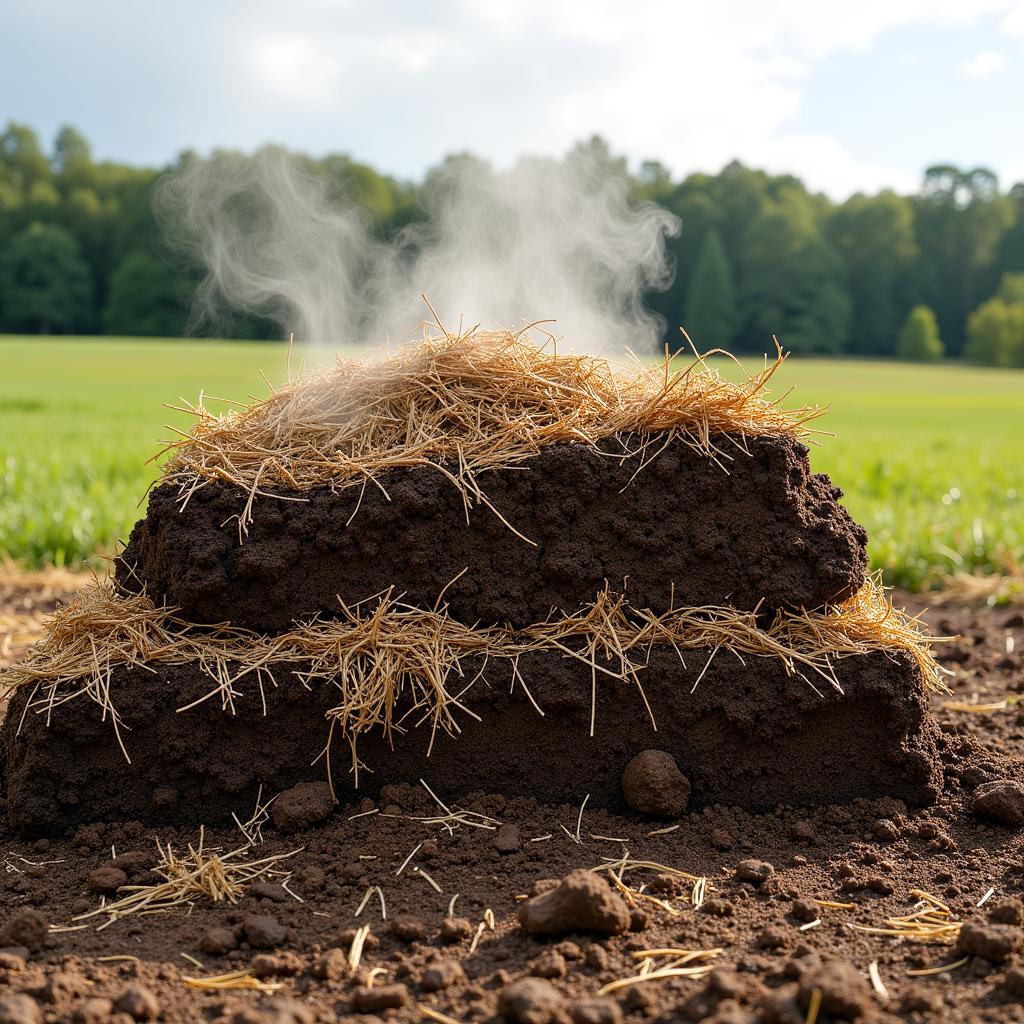Using horse manure in your vegetable garden can be a game-changer, offering a wealth of nutrients for thriving plants. But it’s essential to understand the proper methods to maximize benefits and avoid potential pitfalls. This guide will explore the ins and outs of using horse manure effectively in your garden.
 Composting horse manure for vegetable garden use.
Composting horse manure for vegetable garden use.
The Benefits of Horse Manure for Your Vegetables
Horse manure is a fantastic natural fertilizer, packed with essential nutrients like nitrogen, phosphorus, and potassium, vital for robust vegetable growth. It also improves soil structure, enhancing drainage and water retention, leading to healthier roots and more productive plants. Compared to synthetic fertilizers, horse manure offers a slow-release of nutrients, providing a consistent feed for your vegetables throughout the growing season. Beyond nutrients, horse manure introduces beneficial microorganisms into the soil, further boosting plant health. Using gardening horse manure is a sustainable practice, reducing the need for chemical fertilizers and contributing to a healthier environment.
Preparing Horse Manure for Your Vegetable Garden
Fresh horse manure contains weed seeds and can potentially burn plants. Therefore, it’s crucial to compost it properly before application.
Composting Horse Manure: A Step-by-Step Guide
- Gather your materials: You’ll need horse manure, straw or other carbon-rich materials like dried leaves, and water.
- Build your compost pile: Layer the manure and carbon materials in a ratio of approximately 1:2. Ensure the pile is at least 3 feet wide and high to facilitate proper decomposition.
- Water the pile: Keep the compost moist but not soggy. It should have the consistency of a wrung-out sponge.
- Turn the pile: Regular turning, every 2-3 weeks, aerates the compost and speeds up the decomposition process.
The composting process typically takes between 3-6 months, depending on environmental conditions. The finished product should be dark brown, crumbly, and have an earthy smell.
“Properly composted horse manure is a goldmine for your vegetable garden,” says expert horticulturist, Amelia Green. “It provides a balanced blend of nutrients and enhances soil health, leading to vibrant and productive plants.”
Applying Horse Manure to Your Vegetable Garden
Once your horse manure for sale is fully composted, it’s ready to be incorporated into your vegetable garden. You can spread it as a top dressing or work it into the soil before planting. For established plants, a side dressing of composted manure provides a nutritional boost.
When to Apply Horse Manure
The best time to apply composted horse manure is in the fall or early spring before planting. This allows ample time for the nutrients to integrate into the soil.
Precautions and Considerations
While horse manure is generally safe for vegetable gardens, it’s important to consider a few things:
- Avoid using fresh manure: As mentioned earlier, fresh manure can burn plants and introduce weeds.
- Be mindful of potential pathogens: While rare, horse manure can contain pathogens harmful to humans. Always wash your hands thoroughly after handling manure.
- Consider dehydrated horse manure: This is a convenient option for gardeners who don’t have the space or time to compost.
Conclusion
Horse manure offers an excellent, natural way to enrich your vegetable garden and promote healthy plant growth. By following these guidelines and taking necessary precautions, you can harness the full potential of horse manure and enjoy a bountiful harvest. Remember to compost the manure thoroughly before application to maximize its benefits and minimize potential risks. Using horse manure in your vegetable garden is a rewarding way to nurture your plants and contribute to a more sustainable gardening practice.
FAQs
-
How long does it take for horse manure to decompose?
It typically takes 3-6 months for horse manure to fully decompose. -
Can I use horse manure on all vegetables?
Yes, composted horse manure can be used on most vegetables. -
How much horse manure should I use?
A general guideline is to apply a 2-4 inch layer of composted manure. -
What are the signs of over-fertilizing with horse manure?
Yellowing leaves and stunted growth can indicate over-fertilization. -
Where can I buy horse manure?
Check local stables, farms, or garden centers. You can also find dehydrated horse manure online. -
Is horse manure safe for pets?
While generally safe, keep pets away from fresh manure due to potential pathogens. -
What other materials can I compost with horse manure?
Straw, hay, leaves, and grass clippings are good composting companions for horse manure.
“Using horse manure effectively is a testament to a gardener’s commitment to natural and sustainable practices,” says renowned garden designer, Thomas Miller. “It’s a simple yet powerful way to connect with the natural cycle of growth and decay.”
You may also want to check out these other helpful articles: “Horse Manure Tea for Plants”, “Using Horse Manure as Mulch”, and “Building a Compost Bin for Horse Manure”.
Need help with your horse manure gardening endeavors? Contact us! Phone: 0772127271, Email: [email protected] or visit us at QGM2+WX2, Vị Trung, Vị Thuỷ, Hậu Giang, Việt Nam. We have a 24/7 customer support team.